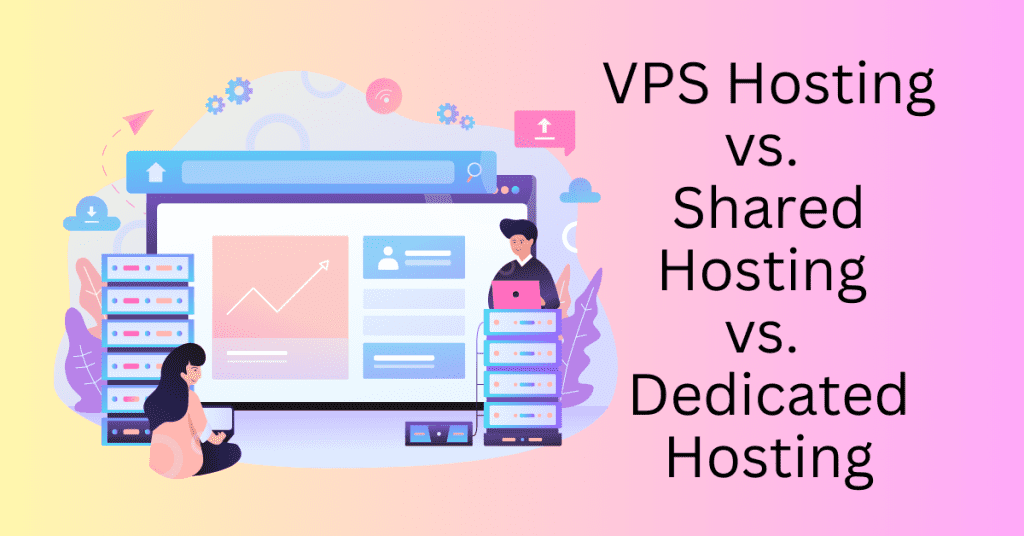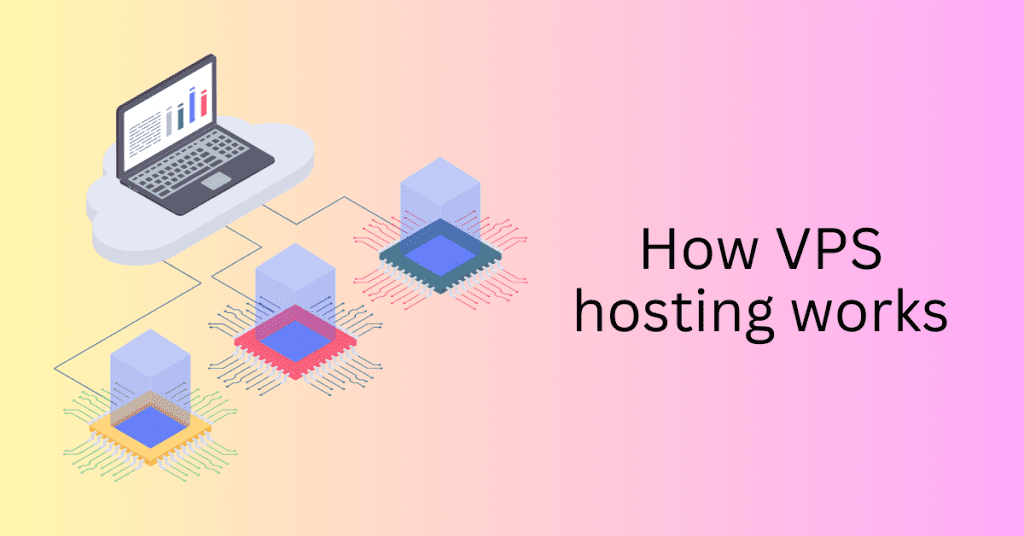When it comes to web hosting, there are different hosting plans available. Each plan is different in terms of the deployment mode, size and configuration. The main hosting plans are generally shared hosting, VPS hosting and Dedicated hosting.
Different hosting plans come with different SLAs and control levels to cater to different business needs. For instance, shared hosting will share the same server resources as other websites, making it the cheapest option among the three. However, due to the sharing of resources, the performance will be affected when traffic spikes.
At the other end would be the dedicated hosting where you are going to get the entire server exclusively for you. This is the most expensive and premium hosting service.
Both hosting plans are good, but there are disadvantages to both of them. Therefore, there is another hosting option to fill the gap.
Today, we will be sharing everything about VPS hosting. You will know whether is VPS hosting suitable for you and whether should you be using it now.
What is VPS hosting?

Virtual Private Server (VPS) hosting emerges as a powerful and versatile solution that bridges the gap between shared hosting and dedicated hosting.
Imagine a VPS as your haven within a bustling digital city – it combines the cost efficiency of shared hosting with the performance and control akin to a dedicated server. This hosting type involves partitioning a physical server into multiple virtual compartments. Each partition operates as an independent server environment with dedicated resources, operating system instances, and customizable configurations.
VPS hosting offers a curated balance of power and affordability, making it an ideal choice for businesses, developers, and digital enthusiasts. This is because they are seeking more control and resources without the full commitment of a dedicated server.
The key allure of VPS hosting lies in its isolated and dedicated resources. It’s like residing in a high-rise apartment where you enjoy private space and amenities, distinct from your neighbours.
With dedicated CPU, RAM, and storage, your website’s performance remains steady and immune to the resource fluctuations that shared hosting might encounter. Moreover, the freedom to customize the server environment to your preferences is akin to interior decorating. You can choose the operating system, software, and configurations that perfectly align with your website’s needs.
This level of control lends itself well to developers and tech-savvy users who require a versatile environment for testing, experimenting, and deploying applications without the constraints of shared hosting’s standardised configurations. Furthermore, VPS hosting offers a pathway to scalability, allowing you to easily allocate more resources as your website’s traffic grows, ensuring seamless user experiences and responsiveness even during traffic spikes.
In essence, VPS hosting provides the golden ticket to a refined online experience, where performance, customization, and scalability converge to elevate your digital aspirations.
Get Started with Web Hosting Now
VPS Hosting vs. Shared Hosting vs. Dedicated Hosting

VPS hosting shared hosting and dedicated hosting stand as distinct pillars in web hosting. Each of them offers a unique blend of features that cater to varying digital needs.
Shared Hosting
For Shared hosting, multiple websites coexist on the same server, sharing resources like CPU, RAM, and bandwidth. This economical option is an ideal starting point for individuals and small businesses seeking an affordable way to establish their online presence.
However, it can lead to performance bottlenecks during traffic spikes. It’s like a crowded marketplace causing delays during peak hours. Shared hosting’s appeal lies in its simplicity and cost-effectiveness. It caters to those who prioritize budget-conscious hosting over resource exclusivity.
Dedicated Hosting
On the other hand, dedicated hosting offers an exclusive experience akin to owning a lavish mansion. With an entire server devoted to a single website, dedicated hosting guarantees unparalleled resources, performance, and customization.
This premium option is tailor-made for large businesses, enterprises, and high-traffic websites that demand maximum control over their server environment. However, the luxury of dedicated hosting comes at a premium price point, making it less suitable for startups or those seeking economical solutions.
It’s comparable to leasing an entire building for your business operation. The expansive space and dedicated resources ensure optimal performance, but the investment can be substantial.
VPS Hosting

Virtual Private Server (VPS) hosting is a harmonious marriage of shared and dedicated hosting attributes. VPS hosting offers a virtual partition within a physical server, creating individual compartments with dedicated resources and customizable configurations.
VPS hosting is particularly attractive to businesses and developers who require enhanced performance and customization without the hefty price tag of dedicated hosting.
The isolated resources eliminate the performance drawbacks associated with shared hosting. It ensures that neighbouring websites’ activities do not impact your site’s loading times. Moreover, the ability to tailor the server environment to your preferences, install custom software, and enjoy root access is a paradise for tech-savvy users seeking flexibility.
VPS hosting also opens the door to scalability, allowing you to easily allocate more resources as your website flourishes. This blend of performance, affordability, and customization encapsulates the essence of VPS hosting. Hence, making it an ideal choice for those who demand more from their hosting environment without breaking the bank. In the grand saga of web hosting, VPS, shared, and dedicated hosting play distinct roles, each catering to specific needs and aspirations.
Web Hosting Type Comparison
| Aspect | VPS Hosting | Shared Hosting | Dedicated Hosting |
|---|---|---|---|
| Resource Allocation | Virtual server with dedicated resources (CPU, RAM) | Host providers may offer automated backups | Entire server resources dedicated to one user |
| Performance | Better performance compared to shared hosting | Handles high-traffic loads efficiently | Best performance due to dedicated resources |
| Cost | Moderate cost, higher than shared hosting | Lowest cost, suitable for small websites | Highest cost due to exclusive resources |
| Customization | High level of customization and control over server settings | Limited customization options | Complete control over server configuration |
| Scalability | Easily scalable, resources can be adjusted as needed | Limited scalability due to shared resources | Limited scalability, requires hardware upgrades |
| Security | More secure than shared hosting, isolated environment | Less secure due to shared environment | High security, isolated environment |
| Server Management | Requires some technical knowledge for management | Minimal technical skills required | Requires advanced technical skills or dedicated server management |
| Traffic Handling | Handles moderate to high traffic depending on resources | Suitable for low to moderate traffic | Host providers may offer automated backups |
| Isolation | Isolated environment, unaffected by other users | Handles high-traffic loads efficiently | Isolated environment for maximum control |
| Suitable For | Medium-sized websites, growing businesses | Small websites, beginners | Large websites, resource-intensive applications |
| Maintenance | User responsible for software updates and maintenance | Hosting providers may offer automated backups | User responsible for server maintenance |
| Backup | User responsible for own backups | Host provider may offer automated backups | User responsible for own backups |
Get Started with Web Hosting Now
How VPS hosting works

Virtual Private Server (VPS) hosting is a technological marvel that orchestrates a balance between shared and dedicated hosting. In addition, it provides users with a virtualized environment that operates like an independent server within a larger physical server.
Each VPS is created using virtualization technology, which divides the server’s resources into distinct compartments. This includes the such as CPU, RAM, storage, and bandwidth.
These virtual compartments act as independent servers, allowing users to install their preferred operating systems, software, and configurations.
The magic of it lies in the hypervisor. A software layer that manages and allocates resources to each virtual server. Think of the hypervisor as the building manager who ensures fair distribution of resources among the apartments, preventing any VPS from consuming more than its share. This separation ensures that the activities of one VPS do not affect the performance of others, granting a level of isolation similar to that of dedicated hosting.
Moreover, VPS hosting offers scalability akin to adding more floors to the building as demand grows. If your website experiences increased traffic or requires additional resources, you can easily allocate more CPU, RAM, or storage to your VPS without affecting neighbouring virtual servers. This adaptability ensures optimal performance even during traffic spikes, making it a preferred choice for businesses that anticipate growth.
In essence, VPS hosting works by creating a virtualized environment within a physical server, allowing users to enjoy the benefits of dedicated resources and customization while sharing the underlying hardware with other VPS instances.
This innovative approach strikes a harmonious balance between performance and cost-efficiency, catering to various users with varying hosting needs.
Get Started with Web Hosting Now
Who Needs VPS Hosting

Virtual Private Server (VPS) hosting emerges as a beacon of versatility. It caters to a wide spectrum of users with distinct needs and aspirations. If you find yourself at the crossroads of shared hosting’s limitations and the hefty commitment of dedicated hosting, VPS hosting is the golden ticket that perfectly aligns with your digital ambitions.
Besides, it’s suitable for entrepreneurs who have outgrown the confines of shared hosting. Those whose websites are thriving, attracting increasing traffic, and demanding more resources to ensure consistent performance.
VPS hosting steps in as a tailored solution, offering dedicated resources within a virtualized environment. This grants your website the bandwidth, CPU power, and memory it needs to shine even during traffic spikes, without the performance bottlenecks that can plague shared hosting.
Whether you’re running an e-commerce store, a content-rich blog, or a rapidly expanding startup, it equips you with the tools to accommodate growth without compromising user experiences.
Developers and tech-savvy also find it an ideal sanctuary for their creative pursuits. If you’re a developer seeking the freedom to experiment with different configurations, install custom software, or run multiple applications, VPS hosting extends an invitation.
Moreover, businesses that prioritize security find solace in VPS hosting’s fortified defences. If you handle sensitive user data, process transactions, or deal with confidential information, VPS hosting’s isolated environment adds an extra layer of protection.
VPS hosting emerges as a versatile solution that caters to entrepreneurs, developers, businesses, and creative minds alike. Furthermore, it’s the bridge that spans the gap between shared and dedicated hosting, providing the performance, customization, and security required to thrive in today’s fast-paced digital age.
Get Started with Web Hosting Now
The Advantage of VPS Hosting

VPS hosting, or Virtual Private Server hosting, presents a host of advantages that make it a compelling choice for individuals, businesses, developers, and tech enthusiasts seeking an optimal hosting solution.
This transformative approach to web hosting offers a dynamic blend of performance, customization, scalability, and security that sets it apart from other hosting options.
1. Dedicated Resources – VPS Hosting
VPS hosting provides dedicated resources within a virtual environment. It ensures that your website’s performance remains consistent and responsive even during traffic spikes. Unlike shared hosting, where resources are shared among multiple websites, it grants you guaranteed CPU power, RAM, and storage, akin to having a virtual server all to yourself.
This dedicated resource allocation translates to faster loading times, seamless user experiences, and the ability to handle increasing traffic without compromising performance.
2. Customization and Control – VPS Hosting
VPS hosting offers a level of customization and control that is unmatched by shared hosting. With root access, you have the freedom to configure the server environment to your exact specifications.
You can install custom software, choose your preferred operating system, and optimize settings for your specific needs. This flexibility is a haven for developers and tech enthusiasts who require an environment tailored to their projects and experiments.
3. Scalability – VPS Hosting
VPS hosting is designed to grow with your website’s demands. As your online presence flourishes and attracts more visitors, you can easily scale up your resources to accommodate the increased traffic.
Whether you’re running an e-commerce store experiencing holiday surges or a growing blog garnering more readers, VPS hosting ensures that your website’s performance remains top-notch even as your audience expands.
4. Enhanced Security – VPS Hosting
VPS hosting offers an isolated environment that enhances security. Unlike shared hosting, where vulnerabilities in one website could potentially impact others, it creates a partitioned space that protects your digital assets from potential threats.
Regular security scans, firewalls, and robust security measures provide a fortified defence against cyberattacks. This makes VPS hosting a favoured choice for businesses that prioritize safeguarding sensitive data and user information.
5. Cost-Effective Solution – VPS Hosting
VPS hosting strikes a balance between shared and dedicated hosting in terms of cost. While it’s more affordable than dedicated hosting, it offers comparable performance and customization options.
This makes it an attractive option for businesses and individuals looking to elevate their online presence without breaking the bank.
Get Started with Web Hosting Now
When You Need VPS Hosting

The decision to transition to Virtual Private Server (VPS) hosting is a pivotal one that hinges on your website’s specific needs, growth trajectory, and technical requirements.
Here are some scenarios that indicate when you might need to consider VPS hosting:
1. Increasing Traffic and Performance Demands
If your website is experiencing a surge in traffic and you notice performance bottlenecks on your current hosting plan, it’s a clear sign that you might need to upgrade to VPS hosting.
VPS hosting provides dedicated resources that ensure consistent performance even during traffic spikes. This will ensure that your website loads quickly and provides a seamless user experience.
2. Customization and Specialized Software
When your website’s needs extend beyond the capabilities of shared hosting. It can be you who will need to install specific software or configure the server environment to match your project’s requirements. Then, VPS hosting becomes a perfect option for you.
Therefore, the level of control and customization offered by VPS hosting allows you to tailor the server environment to suit your exact specifications.
3. E-commerce Growth and Security
If you’re running an online store and processing sensitive customer information, the enhanced security features of VPS hosting can provide peace of mind. Besides, VPS hosting’s isolated environment safeguards your data from potential threats that could impact shared hosting environments.
As your e-commerce store grows, the scalability of VPS hosting ensures that you can handle increased traffic and transactions without compromising security.
4. Resource-Intensive Applications
If your website or applications require more resources than shared hosting can provide, such as running resource-intensive software, hosting game servers, or handling complex calculations, VPS hosting offers the dedicated resources necessary to ensure optimal performance.
This is particularly important if you are a developer and tech enthusiast seeking an environment for your projects and experiments.
5. Multiple Websites or Projects
As your online endeavours multiply, managing multiple websites or projects on shared hosting can become challenging. VPS hosting’s ability to create separate virtual environments within a single server allows you to keep your projects distinct and organized, while also providing the resources needed to sustain their growth.
6. Technical Expertise
If you possess a certain level of technical expertise and prefer to have more control over your server environment, VPS hosting grants you the opportunity to fine-tune settings, install custom software, and configure your server to match your preferences.
7. Future Growth Plans
If you have ambitious plans for your website’s growth and anticipate increased traffic and functionality, transitioning to VPS hosting early on can ensure that you have the infrastructure in place to accommodate your aspirations.
VPS hosting is useful when your website’s traffic is growing, customization and specialized software are required, enhanced security is crucial, resource-intensive applications are being used, multiple projects need to be managed, technical expertise is present, or you have future growth plans.
VPS hosting offers the ideal balance of performance, customization, and scalability for websites that have outgrown shared hosting and require a more robust hosting solution.
Get Started with Web Hosting Now
How to choose the best VPS plan

Selecting the best Virtual Private Server (VPS) plan requires careful consideration of your website’s needs, technical requirements, and growth projections.
Here’s a step-by-step guide to help you navigate the process and choose a VPS plan that aligns with your goals:
1. Assess Your Requirements
Begin by evaluating your website’s current and anticipated resource needs. Consider factors like traffic volume, storage requirements, CPU and RAM usage, and any specialized software you might need.
This assessment will provide a baseline for selecting the appropriate resource allocation in your VPS plan.
2. Determine Technical Specifications
Decide on the technical specifications that are vital for your website’s optimal performance.
Consider the type of CPU, the amount of RAM, the storage capacity (SSD or HDD), and the bandwidth offered in each VPS plan. This is to ensure that the plan you choose provides sufficient resources to handle your website’s traffic and functionality.
3. Operating System and Software Support
Check whether the VPS hosting provider offers a variety of operating systems to choose from. Depending on your website’s requirements, you might need a specific operating system.
Additionally, ensure that the plan supports the software and applications you intend to run on your VPS.
4. Scalability Options
Evaluate the scalability options provided by the VPS hosting provider. As your website grows, you might need to scale up your resources to accommodate increased traffic.
Therefore, you need to choose a plan that allows for easy resource upgrades without causing downtime or disruptions.
5. Managed vs. Unmanaged Hosting
Decide whether you want a managed or unmanaged VPS plan. Managed plans provide technical support and server management, making them suitable for those who aren’t experienced with server administration. Unmanaged plans offer more control but require you to handle server maintenance tasks.
It will largely depend on whether you have the expertise to manage it yourself or not. If you don’t have the technical expertise, then it will be wise to get a managed hosting.
6. Security Features
Check the security features included in the VPS plan. Look for features such as regular security updates, firewalls, DDoS protection, and malware scanning. Security is crucial to protect your website and data from potential threats.
7. Customer Support
Assess the level of customer support provided by the hosting provider. Prompt and knowledgeable support can be invaluable when you encounter technical issues.
Check if they offer 24/7 support through various channels such as live chat, phone, and email.
8. Data Center Locations
Consider the geographical locations of the hosting provider’s data centres. Choosing a data centre closer to your target audience can improve website loading times and user experiences.
9. Reviews and Reputation
Research the hosting provider’s reputation and read reviews from other users. Look for feedback on uptime, customer support, and overall satisfaction to ensure you’re choosing a reliable provider.
10. Price and Value
While cost is a factor, prioritize value over the lowest price. You will also need to compare the features, resources, and support offered in different plans to determine which one offers the best balance of features and affordability.
By considering these factors and aligning them with your business and website’s needs, you can then make a better selection of the best VPS plan that provides the foundation for a high-performing, scalable, and secure online presence.
Get Started with Web Hosting Now
Example of VPS Hosting Plan by Bluehost
There are three VPS plans offered by Bluehost. That is the Standard, Enhanced and Ultimate plan.
All these plans are similar where it will provide unmetered bandwidth and cPanel license included. However, the main difference will be in the virtual server size and configuration.
Depending on your business requirements, you may start from the standard plan and upgrade to the enhanced or ultimate plan when your business grows.
Final thoughts: What Is VPS Hosting? Everything You Need to Know About Virtual Private Servers
In short, VPS hosting is a great product to fill the gap between shared hosting and dedicated hosting. It includes the benefits of both plans while providing lower costs for business owners.
With VPS hosting, you are getting higher website security, storage, control, and bandwidth that works similarly to a dedicated server. However, the price is lower as you are still sharing the same server. The only difference would be VPS server works independently.
Start your web hosting today.





